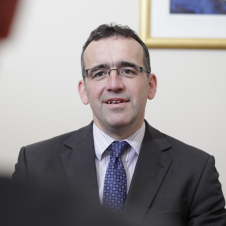Technology leads the way in energy sector mergers and acquisitions (M&A) market

28 February 2023
As the energy sector embraces the parallel drivers of transitioning towards net zero and maintaining energy security, a common focus for achieving both goals has been to improve operating efficiency through technological innovation.
In the past 12 months, this has been reflected by a rise in M&A activity focussed on new technologies for maximising production, decommissioning, reducing emissions, driving down costs and giving potential acquirers a competitive edge.
As Europe’s pre-eminent energy hub, the North-east of Scotland has seen demand from energy service companies actively looking to acquire resources, technologies, and skills in order to maintain a prominent position within the energy supply chain, bolster their existing service offering and secure additional market share through innovation.
Decommissioning a value growth area
Decommissioning is an area where technology is helping to make the economics of this substantial market more attractive, which is a key theme for operators. Offshore Energies UK (OEUK) annual decommissioning report estimated that £20bn will be spent on decommissioning in the next 10 years with 2,100 North Sea wells being decommissioned over the decade, at a rate of around 200 per year.
Although this is clearly a significant opportunity, much of the market remains uneconomical at current costs. A focus on technological development is equally as important for converting this potential into profitable projects that simultaneously allow operators to meet ESG (environmental, social and governance) goals.

Recent transactions reflect appetite for new technology
Across traditional downhole and well intervention markets as well as the decommissioning market, there is demand and capital available from larger service companies to invest in new technologies as they pursue growth at the same time as moving towards net zero and balancing the need for energy security and decommissioning.
This has been evidenced in recent transactions where Johnston Carmichael has advised, including the acquisition last month of Aberdeenshire-based well services, plugging and abandonment (“P&A”) and decommissioning specialist Romar-Abrado by Norwegian oilfield service major, Archer.
Romar-Abrado’s innovative technologies for advanced milling will be a critical element for achieving rigless P&A, the ‘holy grail’ for cost reduction in the P&A sector.
Reflecting the technology theme in the downhole intervention market was the acquisition of Mosco Specialist Oilfield Products (“Mosco SOP") who developed the Exit Sub® tool, a proprietary electro-mechanical recovery method for use when a tool string becomes stuck in-hole, by Impact Selector in the last quarter of 2022.
Further highlighting the adoption of disruptive technology in the downhole market was the acquisition of distributed fibre optic sensing company, SolaSense by Expro during the early part of 2022. SolaSense’s well surveillance technology provides an evaluation of the well and diagnoses issues more quickly and comprehensively than traditional fibre optic technologies. This provides substantial efficiency gains as part of well planning operations and the overall data management process.
Johnston Carmichael advised the shareholders of Romar-Abrado, Mosco SOP and SolaSense, and in each example leveraged its extensive experience of oilfield services transactions utilising relationships with acquirers, the majority of whom are international, to articulate and monetise the proposition.
Considerations for shareholders of technology focused businesses
Technology based transactions by their nature are riskier than more mature opportunities because there is less certainty about the commercialisation and success of the technology and its value. To mitigate against this risk, it is common for these transactions to be structured so that a higher proportion of total consideration is deferred or based on meeting specific targets. Financial metrics can be used, or milestones can be linked to technological progress such as successful field trials. This has practical implications for the shareholders as it may take longer for consideration based on future targets to be received.
There are also several commercial factors that shareholders of innovative technology companies should be aware of. These include the development stage of the technology and whether it has been proven in the field; whether the technology is protected by strong IP; the ease at which the innovation can transfer from the energy sector into other sectors (potentially making the proposition more attractive to acquirers); and the track record of the management team in commercialising the value proposition together with their willingness to continue doing so.
Throughout 2023 we expect to see these M&A trends continue with companies that have innovative technology playing a key role in meeting the wider demands of the energy sector by filling organisational gaps in knowledge, skills, and expertise.
To find out more, please get in touch with myself, or a member of the Corporate Finance team.

